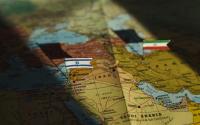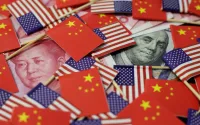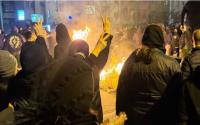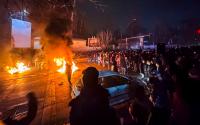 Lawrence Boxall is an anti-war activist and socialist; a member of Jews for a Just Peace, Stopwar.ca and the International Socialists, as well as being a veteran of the anti-Apartheid struggle in South Africa. Before moving to Vancouver in time to participate in the ignominious Operation Solidarity (thanks again, Jack Munro), Boxall was an alternative journalist and an active participant in South Africa's radical, anti-racist student movement. With South Africa in the news this week, he responded to our questions via e-mail.
Lawrence Boxall is an anti-war activist and socialist; a member of Jews for a Just Peace, Stopwar.ca and the International Socialists, as well as being a veteran of the anti-Apartheid struggle in South Africa. Before moving to Vancouver in time to participate in the ignominious Operation Solidarity (thanks again, Jack Munro), Boxall was an alternative journalist and an active participant in South Africa's radical, anti-racist student movement. With South Africa in the news this week, he responded to our questions via e-mail. 1) We at Seven Oaks are fully aware that many British Columbians still refer to Haida Gwai'i as "the Queen Charlottes"; nevertheless, would you care to comment on the demonstrations by South African whites this week to protest a plan by the South African government to rename the capital city Pretoria 'Tshwane' – the name of a historic chief, which also means 'We are the same'?
It's like the Christian Fundamentalist supporters of George Bush and the Republican party who feel that they are discriminated against because of their Christian beliefs. I'm sure these white Afrikaners feel a genuine sense of loss now that they can no longer lord it over the majority. There was a certain nobility in their fight against British Imperialism which was particularly ruthless towards the Afrikaner by comparison with how the British treated the Quebecois.
However, their demonstration indicates to me that they have not yet come to terms with the social crime they committed against the entire unenfranchised population of Apartheid South Africa. From being the victims of the British Empire they joined with the British in exploiting the indigenous Black population as well as the people who were imported into the country to do the grunt work. And as an aside, I was born in the British-named Robert's Heights just outside Pretoria. The Afrikaners changed my birthplace to Voortrekkerhoogte to celebrate their cultural icons.
2) There was also a big push throughout the 1990s by some to change the name of the country as a whole from 'South Africa' to 'Azania'; do you see these as substantial cultural questions, or as nationalist diversions from the ANC's sometimes-disappointing domestic policies? Or both?
For most of my adult life, I have dreamed of a just socialist country called Azania. A country where racism is a distant echo of a tragic past and where everyone works together for the good of all. A country that would play a constructive role in helping the rest of Africa overcome its colonialist past without being tempted to play its own imperialist role.
These are substantial cultural questions but they remain merely cosmetic if they are a substitute for the establishment of social justice.
3) South Africa was in the news again this week when the BBC online reported on the disappointment expressed by the government's deputy minister of minerals Lulu Xingwana at the decision of the De Beers diamond firm to replace white directing manager Gary Ralfe next year with the also-white Gareth Penny, adding to an executive board that Xingwana decried as "lily-white and male dominated." To what extent do these old hands of racist, capitalist South Africa impede the progress towards the "non-racial, democratic South Africa" promised by Nelson Mandela?
I think it is tragic that the reality of Apartheid was understood by and large as a racist issue. What Apartheid meant for South Africa was a rate of capital accumulation unmatched anywhere else. At the outset most of industrial capital was in the hands of English South African and British interests. Afrikaner capital was largely restricted to a sort of a landed aristocracy. The wealthy Afrikaners were farmers in many cases producing luxuries for the European market. The Apartheid system allowed the Afrikaner elite to enter significantly into mining and industry, but it also allowed all the rest of the capitalist class to accumulate capital extremely rapidly.
The end of Apartheid was inevitable when changing circumstances resulted in it becoming counter-productive to the efficient accumulation of capital. Thus within the ruling class support for Apartheid began to evaporate. Apartheid has gone and been replaced by globalization as a means of super-exploitation of the majority. To me it is irrelevant what the race or gender of the De Beers board of directors is as long as it remains an organization whose purpose is to enrich the minority, black or white. Nationalize De Beers and then let the people elect the board.
4) Post-apartheid South African administrations as well as former anti-apartheid activists – yourself included – have been forefront in the fight against the dispossession, occupation and ethnic cleansing of the Palestinians. Why do you think this link is so strong?
On a purely emotional level, everything about the relationship between the Israeli Government and the Palestinian People reminds me so strongly of South Africa. When I first heard Netanyahu speaking my inner being felt as though I was listening to a South African Government Minister speaking in the 1970s. However, I think this is a similarity of outward appearances only. As vicious as the South African Apartheid regime was, I think that what Israel is currently doing to the Palestinians is manifestly worse. The purpose of Apartheid was never to rid the country of Blacks, nor was it to deprive them of all means of livelihood in the hope that they would disappear to Botswana or elsewhere. As much as Apartheid was an obscene afront to human dignity what Israel is doing beggars description. To remain quiet about this, particularly because I am not a victim, would render my life utterly worthless. I oppose Israel because I have no choice in the matter.
5) Groups such as Jews for Just Peace, of which you are a member, are often implicitly presented as being less "authentically Jewish" than pro-Zionist, pro-occupation groups such as the Anti-Defamation League or the Canadian Jewish Congress. Why do you think this hijacking of the Jewish tradition goes so unchallenged in the mainstream media?
I am answering in my personal capacity and not as a spokesperson for Jews for a Just Peace. In answer to your question it is simply because the mainstream media is complicit in this and all other forms of exploitation carried on by the vested interests of which they are an integral part. The mainstream media has successfully blinded the majority of people, including the majority of Jews, into believing that support for the Zionist enterprise is principled. Lacking challenging questions, most people don't think too much about the issues.
6) Do you think that the progress made by the anti-war movement in putting Palestine on the progressive agenda is an irreversible gain? Or can Palestine be pushed back onto the backburner?
I think we are in the early stages of a dramatic and encouraging change in the situation. The Zionist-supporting establishment is showing signs of desperation. They have abundant resources at their disposal and will certainly put up a massive fight to maintain the facade of legitimacy for the Zionist enterprise.
However, it is becoming clear that, for both Jew and non-Jew, the more people learn about the plight of the Palestinians as well as the history of the conflict, the more sympathetic they become to bringing about a just peace. "Just" is the operative word in this quest for peace. I think a large number of Jews are afflicted with a tunnel vision engineered by the Zionist establishment, but ultimately most decent people will do the right thing when they are aware of the facts. I think in open debate the propaganda advantages Zionism has enjoyed for so long will be neutralized. I am very optimistic about where this is going in the immediate future and think that there is no way Palestine can return to the backburner.
7) One of the easiest ways to distinguish a person's politics with regards to the Israel-Palestine question is whether they refer to Israel's current construction project as the "Security Fence" or the "Apartheid Wall." I know which term you prefer – but as a veteran of the fight against apartheid, can you explain why?
To be perfectly honest, I use the term "Apartheid Wall" simply out of respect for the sensitivities of the victims of the Wall. They have the primary right to decide what to call it. From a purely economic analysis I have a lot of trouble with the term Apartheid being applied to the situation of the Palestinian people. The economic relationship between the South African Blacks and the Apartheid state was one in which the Blacks played a very important role. There could be no wall built to isolate whites from Blacks because Blacks were crucial to the rapid growth of the South African economy in the post WWII years.
All the Zionists want from the Palestinians is their land and resources. Labour they can get from elsewhere. The importance of the Palestinian worker to the Israeli economy is closer to the importance of the Jews to Germany's economy in 1938, but I haven't heard anyone speaking about the Nazi Wall. I am not terribly fond of sloganeering as a political weapon because it often just introduces red herrings which detract from debating the real issues. It is not necessary to call Israel an Apartheid state, though it does bear striking resemblances, in order to point to the social crimes happening there. Israel does not have to be proved to be an Apartheid state in order for Sharon to be charged with crimes against humanity. The facts speak for themselves without having to add emotive elements for good effect.
No parallels are completely congruous but I think that what Israel is doing to the Palestinians is closest to what America and Canada have done and are doing to the aboriginal inhabitants of North America. Zionism is simply a brutal colonial venture perpetrated, as usual, largely by Europeans and their descendents against other races on our planet.






